Asia
The Eighth Japan-China-ROK Trilateral Summit
December 24, 2019
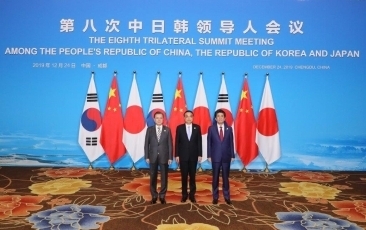 Commemorative photograph session at the Japan-China-ROK Trilateral Summit Meeting
Photo: Cabinet Public Relations Office
Commemorative photograph session at the Japan-China-ROK Trilateral Summit Meeting
Photo: Cabinet Public Relations Office
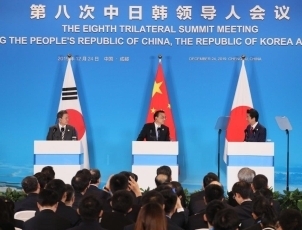 Japan-China-ROK joint press announcement1
Photo: Cabinet Public Relations Office
Japan-China-ROK joint press announcement1
Photo: Cabinet Public Relations Office
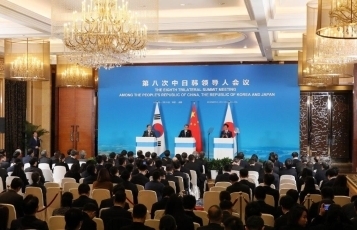 Japan-China-ROK joint press announcement2
Photo: Cabinet Public Relations Office
Japan-China-ROK joint press announcement2
Photo: Cabinet Public Relations Office
On Tuesday, December 24, from 10:00 to 11:15 a.m. (local time), the Eighth Japan-China-ROK Trilateral Summit meeting was held in Chengdu. The overview of the meeting is as follows. (The participating leaders were H.E. Mr. ABE Shinzo, Prime Minister of Japan; H.E. Mr. Li Keqiang, Premier of the State Council of the People’s Republic of China; and H.E. Mr. Moon Jae-in, President of the Republic of Korea [ROK].) Following the meeting, the outcome document “Trilateral Cooperation Vision for the Next Decade (PDF) ” was released.
” was released.
 ” was released.
” was released.1 General remarks
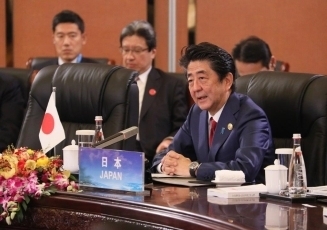 Prime Minister making a statement at the Japan-China-ROK Trilateral Summit Meeting1
Photo: Cabinet Public Relations Office
Prime Minister making a statement at the Japan-China-ROK Trilateral Summit Meeting1
Photo: Cabinet Public Relations Office
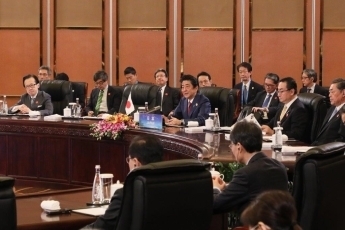 Prime Minister making a statement at the Japan-China-ROK Trilateral Summit Meeting2
Photo: Cabinet Public Relations Office
Prime Minister making a statement at the Japan-China-ROK Trilateral Summit Meeting2
Photo: Cabinet Public Relations Office
This Summit was held on the 20th anniversary of the commencement of Japan-China-ROK cooperation. The three leaders reviewed the trilateral cooperation over the past two decades and discussed the direction of the trilateral cooperation for the next decade. The leaders exchanged their views regarding regional and international affairs, including the issue of North Korea.
2 Assessment of Current Trilateral Cooperation and Its Future Direction
Prime Minister Abe stated as follows.
(1) In the last two decades, future-oriented practical cooperation, which is the root of the trilateral cooperation, has made steady progress. For the next decade, based on past dialogues and cooperation, the three countries should implement tangible cooperation in areas that they have the lead in the world, for the future and future generations not only of the three countries but also of the region and the globe.
(2) In particular, at the G20 Osaka Summit in June this year, attended by China and the ROK, the Leaders’ Declaration was adopted, in which the leaders agreed upon the principles in the area of trade and investment, marine plastic litter, and quality infrastructure investment among others. Going forward, the three countries will work collectively to implement the principles that were agreed upon and promote them to the world including Asia. I would like to spread the concepts fostered at the G20, jointly with China and the ROK, through making use of the trilateral framework. Based on this recognition, I would like to discuss mainly three E’s that should serve as pillars of the trilateral cooperation in the next decade.
A. Environmental Problem
- Today, not only people but also litter that traverse the seas, which has become common issue of the three countries.
The Osaka Blue Ocean Vision agreed upon at the G20 Osaka Summit this year and the Implementation Framework for its achievement are the foundation for resolving the issue. - I welcome that, at the Tripartite Environment Ministers Meeting last month, the three countries started concrete actions under this Vision agreed upon in Osaka and the Implementation Framework. Japan, China, and the ROK will seek to lead the world on marine plastic litter cooperation.
B. Elderly Society
- Japan, the fastest aging society in the world, has been constantly reviewing its existing systems.
- China is a country with the largest elderly population, and the ROK, like Japan, is one of the fastest aging countries in the world. Facing common issues, the three countries will cooperate with each other to achieve an active and healthy aging society.
- In addition, Japan will share the best practices learned from trilateral cooperation with international community and contribute to the development of world, including Asia, and to well-being of the peoples.
C. Exchange
- Bond between the peoples forms the basis of mutual understanding among the three countries. People-to-people exchanges at the private-sector level are important, even in the time of difficulty at the governmental level. I will continue to promote people-to-people exchanges among the three countries.
- I welcome that the goal of “30 million people-to-people exchanges annually among the three countries by 2020” was achieved in 2018, ahead of schedule. Educational exchanges lay the foundation of close relations in the future, and CAMPUS Asia is one example of successful trilateral cooperation.
- The Olympic and Paralympic relay by the three countries offers a significant opportunity for various exchanges, including sports, cultural, and tourism exchanges. I will strive to ensure that the 2020 Tokyo Games is successful and hand over the baton received from the 2018 PyeongChang Games to the 2022 Beijing Games.
(3) Japan intends to promote trilateral cooperation so that the three countries can build win-win-win relations featuring the three E’s.
Based on the above, the three countries shared the opinion on: tackling common issues, such as marine plastic litter; promoting a healthy and active aging society; strengthening people-to-people exchanges, including sports, cultural, and education exchanges; and promoting cooperation between the three countries and others.
3 Regional and Global Situations
(1) Korean Peninsula
Prime Minister Abe stated as follows.
- The complete denuclearization of North Korea is a common goal of the three countries. It is important that the three countries continue to give their utmost support to the process between the U.S. and North Korea toward the complete, verifiable, and irreversible dismantlement (CVID) of all weapons of mass destruction and ballistic missiles of all ranges of North Korea, in accordance with United Nations Security Council (UNSC) resolutions.
- It is essential to ensure the full implementation of UNSC resolutions.
- North Korea’s repeated launches of ballistic missiles are a violation of UNSC resolutions.
- Japan’s basic policy of seeking to normalize its relations with North Korea through comprehensive resolving outstanding issues of concern, such as the abductions, nuclear and missile issues, as well as settlement of the unfortunate past remains unchanged. Japan seeks your continued cooperation.
The three leaders confirmed that the three countries continue to share the position of steadfastly implementing the relevant UNSC resolutions and continuing to maintain the momentum of the process between the U.S. and North Korea. In addition, Prime Minister Abe sought the two leaders’ support and cooperation for the early resolution of the abductions issue and obtained their understanding on Japan’s position.
(2) Economy
Prime Minister Abe stated as follows.
A. Free trade and investment
- At the G20 Osaka Summit his year, the leaders agreed on the fundamental principle of a free, fair, non-discriminatory, transparent, predictable, and stable trade and investment environment. Under this principle, we should strengthen the multilateral trading system with the WTO as the cornerstone, promote a free and fair rules-based economic zone throughout the world, and ensure a level playing field.
- From this perspective, Japan intends to aim for the early signing of the Regional Comprehensive Economic Partnership (RCEP) agreement by the 16 countries, in accordance with the Joint Leaders’ Statement of November 4. Regarding the Japan-China-ROK Free Trade Agreement (FTA), Japan will steadily advance the negotiations to achieve an agreement with sufficient added value to the RCEP agreement.
B. Development
The G20 leaders, including Japan, China, and the ROK, confirmed the importance of elements such as openness, transparency, economic efficiency, and debt sustainability in the G20 Principles for Quality Infrastructure Investment. For the sustainable development of the region and the world, it is essential that we, the leading three countries of Asia, steadily promote and implement quality infrastructure investment in line with the G20 Principles.
The three leaders shared the opinion that Japan, China, and the ROK make up a significant share of the world economy’s GDP and trade and investment, and as such, they have and will continue to fulfill a critical role, and that free and fair trade and investment are crucial for the further development of the world economy. Furthermore, the three leaders confirmed that they will continue to make efforts to achieve a modern, comprehensive, high-quality, and mutually beneficial RCEP agreement. The three leaders also shared the view on pursuing a Japan-China-ROK FTA with sufficient added value to RCEP.
(3) “Free and Open Indo-Pacific”
Prime Minister Abe stated as follows.
Japan seeks to realize a free and open Indo-Pacific based on the rule of law. From this perspective, Japan will pursue synergies between Japan’s initiatives and the “ASEAN Outlook on the Indo-Pacific (AOIP)” adopted by ASEAN, while respecting ASEAN centrality and unity. I look forward to the efforts by China and the ROK to coordinate with the AOIP, while respecting ASEAN centrality and unity.
(4) Global Issues
Prime Minister Abe stated as follows.
At the G20 Osaka Summit and TICAD 7 hosted by Japan this year, I, as chair, spearheaded efforts to address global issues, including climate change, environment, energy, disaster risk reduction, education, and health. Japan intends to cooperate with China and the ROK on these issues.
The three leaders then shared the need to actively tackle climate change and environmental issues in particular.

